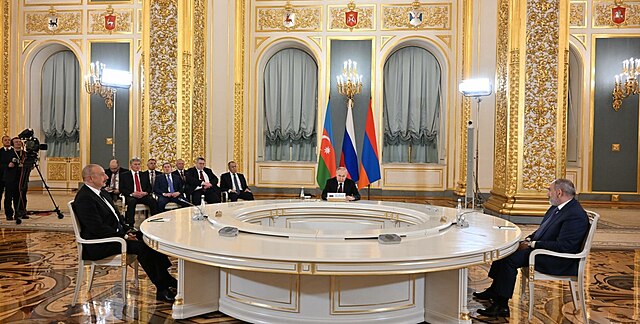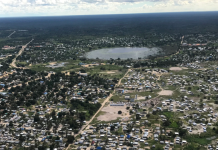In his recent article, Azerbaijan’s ambassador to the Norway, Sweden, Denmark and Finland presents an optimistic yet ultimately one-sided perspective on the prospects for peace between Armenia and Azerbaijan. While promoting a peace treaty as “within reach,” the ambassador’s narrative fails to grapple with the underlying power imbalance and coercive assumptions shaping the current diplomatic environment. Rather than paving a path toward sustainable reconciliation and lasting peace, the Azerbaijani position reflects a zero-sum mentality, where peace is equated with Armenia’s full capitulation. Genuine and dignified peace, however, cannot be built on domination, intimidation, or the language of one side dictating terms to its rivals.
The core issue is the illusion that both sides are negotiating on equal footing. In reality, Azerbaijan approaches the post-war context not as a partner seeking mutual accommodation, but as a “victor” demanding compliance. The 2020 war, followed by further escalations in 2022- when Azerbaijani troops crossed into the sovereign territory of Armenia and have since maintained their occupation of those areas – and the September 2023 offensive that resulted in the forceful depopulation of Nagorno-Karabakh’s Armenian population, underscore the fact that military power continues to be Baku’s preferred instrument of conflict “resolution”. The ambassador’s statement that “in practice, both countries have laid down their weapons” conveniently disregards both the recent instances of military aggression and Azerbaijan’s continued large-scale acquisition of arms and advanced weaponry.
This dynamic reveals the dangerous precedent Azerbaijan is setting: that the use of force yields results and that diplomatic gains should naturally follow battlefield victories. If this logic is accepted as the foundation for regional peace, it not only erodes the credibility of international norms but also invites perpetual instability. Ironically, the very rationale that Baku uses to justify its maximalist demands mirrors the same logic employed by authoritarian powers elsewhere, including Russia, whom the EU and its allies often criticize. If peace through strength rooted in the idea of realpolitik is merely the byproduct of power and pressure, then why condemn Russia’s aggressive tactics in Ukraine while applying similar approaches in the South Caucasus?
Moreover, Azerbaijan’s insistence that Armenia amend its constitution as a precondition for peace is not only an illegitimate demand but a textbook example of hybrid malign tactics—political coercion disguised as diplomacy. Forcing a sovereign state to rewrite its internal legal foundations for whatever reason under threat of continued isolation or force mirrors the very tactics used by authoritarian powers elsewhere, including Russia’s approach to Ukraine. This demand has nothing to do with genuine peace and everything to do with asserting political control. Instead of tackling real issues—such as security guarantees, respect for sovereignty, or humanitarian solutions—Baku insists on maximalist conditions designed to maintain imbalance and stall any honest dialogue.
Equally concerning is Azerbaijan’s aggressive promotion of the so-called Zangezur Corridor—a demand that undermines Armenia’s sovereignty and raises serious security concerns despite some irrational euphoria by some Western actors. Pushing for an extraterritorial land route that bypasses Armenian legal and customs jurisdiction is not a measure of regional connectivity, but one of imposed geopolitical leverage. A peaceful future cannot be engineered through threats of territorial imposition disguised as economic development. Connectivity should be based on reciprocity, yet Azerbaijan has repeatedly declared it has no intention of granting Armenia access to its infrastructure. Azerbaijan’s goal is to sustain Armenia’s political and economic isolation by all means, including through Turkey’s continued closure of its borders with Armenia.
Azerbaijan’s leadership regards the so-called Zangezur Corridor as an internal route that should connect Baku to Ankara without any obstacles and fails to understand why or how Armenia could oppose it.
Peace imposed from a position of superiority and without mutual confidence is inherently fragile. If one party feels humiliated or coerced, any agreement will be temporary and vulnerable to collapse under shifting political winds. True reconciliation must be based not on the logic of submission, but on mutual recognition, compromise, and respect for the dignity and narratives of both peoples. Azerbaijan’s framing of the OSCE Minsk Group as obsolete further illustrates its desire to unilaterally rewrite the terms of engagement. While the format may have lost relevance, the multilateral principle it embodied—that of inclusive, internationally mediated dialogue—remains indispensable.
Moreover, the ambassador’s references to the one-sided return of displaced Azerbaijani citizens that Azerbaijan keeps cynically using as a diplomatic shield to deflect responsibility and block meaningful progress, completely overlook the historical and ongoing suffering of Armenian populations. Hundreds of thousands of Armenians were forced to flee cities like Baku, Sumgait, and other Azerbaijani towns in the late 1980s and early 1990s to escape targeted violence and pogroms—events widely recognized as ethnic cleansing, if not genocide. This suffering was further compounded by the brutal war against civilians in Nagorno-Karabakh in 2020 and the forced exile of all Armenians from the region in 2023.
All these Armenian individuals remain displaced to this day, with no acknowledgment of their suffering or pathways for safe return. Any serious discussion of refugee returns must address both sides with equal and symmetrical actions.
And last, but not least, peace is not possible without reaching a balance of power and reducing explicit asymmetries. Sustainable agreements require a framework where neither side feels dictated to, and both perceive security and political agency as mutually protected. This also means a significant reduction in militaristic rhetoric from Azerbaijani leadership, which continues to project threats and assert dominance rather than foster reconciliation. Confidence-building measures are indispensable, and they cannot coexist with a public discourse that glorifies military force or threatens renewed violence.
In conclusion, peace between Armenia and Azerbaijan cannot be forged through dictates, selective memory and unequal conditions. It requires an honest reckoning with the past, an end to triumphalist rhetoric, and a shared commitment to peace and coexistence. Until Azerbaijan abandons its view of Armenia as the defeated party whose role is merely to submit, rather than to negotiate, peace will remain not “within reach,” but out of touch with reality.

















